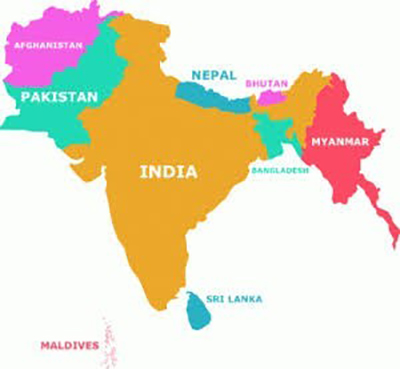Date: 07/04/2023
Relevance: GS-2: India and its Neighbourhood- Relations.
Key Phrases: South Asian region, Shared Civilizational Area, Unique Indian values, Cultural And Civilizational Unity, social contract, Economic and Technological Growth, peaceful coexistence, Reciprocity, and Generosity, embracing modernization.
Why in News?
- South Asian politics is characterized by uncertainty, with political, economic, and security crises.
- From Pakistan's implosion, a bleak political scenario in Nepal, and an enfeebled opposition in Bangladesh, to the Maldives' democratic shift and Sri Lanka's economic meltdown, South Asia has become an area of political turbulence.
Unique Indian values
- Shared Civilizational Area:
- The South Asian region constituted an integrated civilisational area bound together by shared religions, languages, cultural traditions and blood ties and, in respect of the three largest countries — India, Pakistan and Bangladesh - shared historical memories as well.
- Difference in value system:
- The values underlying the Indian state stood out in contrast to those espoused by several of its neighbours.
- These values — secularism, democracy, federalism, and linguistic autonomy — were not matters of choice for India. They were compulsions if Indian unity and integrity were to be preserved.
- Absorption and Internalization:
- India pursued these values because they were not just imported Western values but because they were absorbed and internalised during India’s century-long freedom struggle.
- India had endured because of its enormous capacity to absorb, internalise, modify and transform, and yet retain its personality.
- Adoption of Values:
- In the 19th century, as democratic values emerged in Western Europe, they were accepted on an eclectic basis in India.
- This resulted in the adoption of local government, free press, trade union rights, liberal democratic multiparty competitive politics, adult suffrage, secular outlook, and acceptance of the state as a vehicle of development, which became planks in the freedom struggle.
- The representational system of government in India was the envy of most of the developing world, as was the totally apolitical functioning of the Indian armed forces and the critical role of the Indian press.
India as a Unity:
- Cultural and Civilizational Unity:
- India's unity and integrity have been questioned by some of its neighbours who argue that India was never united before the British brought the whole country under a single administrative structure.
- However, this is not accurate since several centuries ago, there was widespread recognition of India and Hindustan as a unity in terms of culture, civilization, and administrative structure.
- The concept of India as a unity was recognized even outside India, as evidenced by the granting of a charter to the East India Company by Queen Elizabeth I and the naming of the ocean around India as the Indian Ocean.
- From the concept of "Aah Sethu Himachalam" to the Ashokan edicts, the idea of India as a cultural, civilizational unity differentiated from its surroundings has formed the basis of the country's nationhood.
- Basis of nationhood:
- Shared historical memories, not language or religion, are what bind a people together as a nation.
- The unity and integrity of a nation have to be based on a social contract among the people to be formulated and sustained through representative structures.
- Nationhood is a secular political concept that should be based on territoriality and a vision of society proposed to be built.
- Confusing social mores and societal values from centuries ago with eternal religious truths cannot form a firm basis for modern nation-states.
Conflict within India:
- India faces a problem of conflict between those who want to build social, political, and economic structures based on evolving knowledge and those who want to freeze such evolution, arguing that societal structures should be based on traditions, scriptures, and belief systems formulated centuries ago.
- This struggle is essentially between integration towards a universalized and internationalist society and fragmentation based on one group's differences from the rest, arising out of an innate fear of and inability to cope with the world at large.
Keys to coexistence
- Economic and Technological Growth:
- India should focus on its economic and technological growth in order to establish itself as a powerful country in the region.
- As India grows, its neighbours will adjust themselves to the Indian reality and stop thinking of external powers like China as countervailing factors.
- Military Power:
- India should develop its military power to shield itself from the turbulence around it and be ready to respond to the pressures of this age of coercive diplomacy.
- Diplomacy:
- India's diplomacy should place less emphasis on its South Asian neighbours and focus more on its relations with China, the U.S.S.R (now Russia), the United States, the industrialized world, South East Asia, West Asia, and Africa.
- Low-Key Role in SAARC:
- India's neighbours, especially Pakistan, want it to play a very low-key role in the South Asian Association for Regional Cooperation.
- India should do exactly that and exercise extreme patience until such time as its neighbours realize how much it can help them in their nation-building and development.
- Reciprocity and Generosity:
- Reciprocity is a basic requirement for cooperation on issues such as river waters and the use of natural resources, but once the principle of reciprocity is accepted, India should go the extra mile and be generous.
Conclusion:
- South Asian politics is in a state of uncertainty but a long-term view of shared historical memories and values can help maintain unity.
- India's foundational values have played a crucial role in preserving its integrity.
- India must continue to develop economically and technologically while being prepared to respond to its neighbours.
- Peaceful coexistence will depend on embracing modernization while maintaining cultural identities.
Source: The Hindu
Mains Question:
Q. Analyse the current political, economic and security crises in South Asia and critically examine the relevance of the values that underlie the Indian state in addressing them. Also discuss the keys to peaceful coexistence in the subcontinent.






















